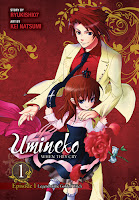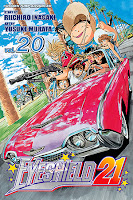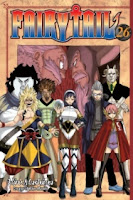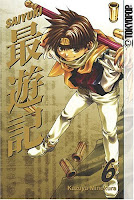Support manga, support your library!
Here’s what I’ve been reading:
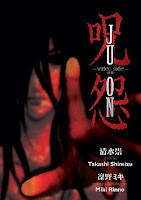 Ju-On: Video Side by Miki Rinno. I haven’t actually seen any of the the films in Takashi Shimizu’s Ju-On franchise, but I believe that Ju-On: Video Side is an adaptation of the first direct-to-video Ju-On movie, also known as The Curse. The manga opens with a woman being murdered by her husband as their young son looks on. Because of the violence and deaths associated with the house, the property is difficult to sell. Despite being warned against it, the Murakami family moves in. Their lives are quickly consumed by horrifying incidents and bizarre accidents. Anyone even remotely connected to the household is at risk as the vengeful spirits take out their anger on the living.
Ju-On: Video Side by Miki Rinno. I haven’t actually seen any of the the films in Takashi Shimizu’s Ju-On franchise, but I believe that Ju-On: Video Side is an adaptation of the first direct-to-video Ju-On movie, also known as The Curse. The manga opens with a woman being murdered by her husband as their young son looks on. Because of the violence and deaths associated with the house, the property is difficult to sell. Despite being warned against it, the Murakami family moves in. Their lives are quickly consumed by horrifying incidents and bizarre accidents. Anyone even remotely connected to the household is at risk as the vengeful spirits take out their anger on the living.
 Nana, Volumes 9-12 by Ai Yazawa. I continue to be impressed by Yazawa’s Nana. I have a feeling that this will be a series that I end up buying to have a copy of my own. It’s just that good. The characterization in Nana is phenomenal. As the series progresses, the characters continue to evolve and grow. They are all multi-layered and their relationships are complex. While the interpersonal drama is still extraordinarily important in Nana, these particular volumes start to focus on Trapnest and Black Stones as bands a bit more. The two groups and their members are revealed to be very closely linked. Complicating matters further, they’re harassed by paparazzi. Their careers get in the way of love and romance as they lose some control over their own lives to their music labels.
Nana, Volumes 9-12 by Ai Yazawa. I continue to be impressed by Yazawa’s Nana. I have a feeling that this will be a series that I end up buying to have a copy of my own. It’s just that good. The characterization in Nana is phenomenal. As the series progresses, the characters continue to evolve and grow. They are all multi-layered and their relationships are complex. While the interpersonal drama is still extraordinarily important in Nana, these particular volumes start to focus on Trapnest and Black Stones as bands a bit more. The two groups and their members are revealed to be very closely linked. Complicating matters further, they’re harassed by paparazzi. Their careers get in the way of love and romance as they lose some control over their own lives to their music labels.
 The Nao of Brown by Glyn Dillon. I was happy to discover that all the praise The Nao of Brown has received was well-deserved: Dillon’s artwork is gorgeous and the storytelling is mature. Nao Brown is half-Japanese and half-English, living in London with Purely Obsessional OCD. She is plagued by violent thoughts and is afraid that one day she actually will hurt someone, which makes leading a normal life and developing healthy relationships with other people difficult. But then she meets Gregory, a burly washing machine repairman who reminds her of one of her favorite anime characters. The two of them hit it off pretty well, but not without some problems.
The Nao of Brown by Glyn Dillon. I was happy to discover that all the praise The Nao of Brown has received was well-deserved: Dillon’s artwork is gorgeous and the storytelling is mature. Nao Brown is half-Japanese and half-English, living in London with Purely Obsessional OCD. She is plagued by violent thoughts and is afraid that one day she actually will hurt someone, which makes leading a normal life and developing healthy relationships with other people difficult. But then she meets Gregory, a burly washing machine repairman who reminds her of one of her favorite anime characters. The two of them hit it off pretty well, but not without some problems.
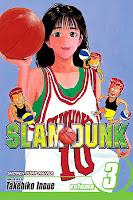 Slam Dunk, Volumes 3-6 by Takehiko Inoue. I am much more familiar with Inoue’s later seinen works Vagabond and Real than I am with Slam Dunk, his immensely popular breakthrough series. Although there are some similar themes to be found in all three series, Slam Dunk is more obviously humorous than the other two. It’s great fun. I’m very fond of Hanamichi as a protagonist. He’s a sort of delinquent with a heart of gold. Actually, the delinquent aspects and Hanamichi’s gang are some of my favorite parts of Slam Dunk. Of course, the basketball is good, too, and really the focus of the series. By this point, Hanamichi finally gets the chance to play in a real game. Even though he’s still a new player and makes plenty of mistakes, he also shows an impressive amount of potential.
Slam Dunk, Volumes 3-6 by Takehiko Inoue. I am much more familiar with Inoue’s later seinen works Vagabond and Real than I am with Slam Dunk, his immensely popular breakthrough series. Although there are some similar themes to be found in all three series, Slam Dunk is more obviously humorous than the other two. It’s great fun. I’m very fond of Hanamichi as a protagonist. He’s a sort of delinquent with a heart of gold. Actually, the delinquent aspects and Hanamichi’s gang are some of my favorite parts of Slam Dunk. Of course, the basketball is good, too, and really the focus of the series. By this point, Hanamichi finally gets the chance to play in a real game. Even though he’s still a new player and makes plenty of mistakes, he also shows an impressive amount of potential.

